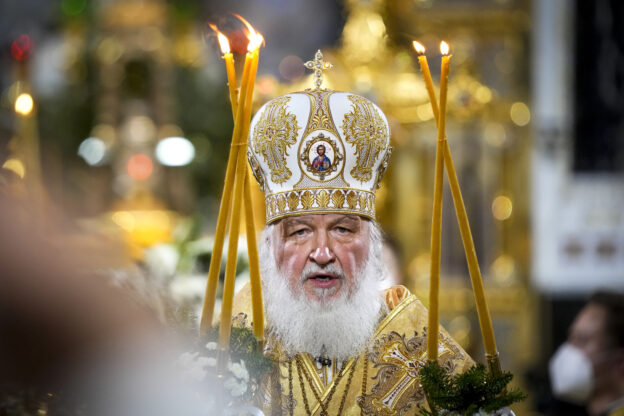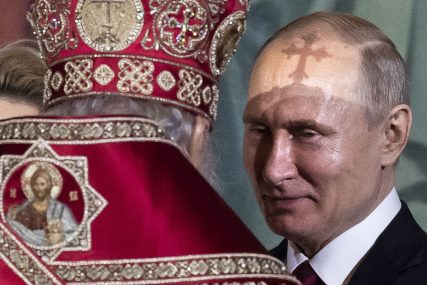
(RNS) — A Russian Orthodox priest was reportedly arrested this week after he preached a sermon denouncing the Russian invasion of Ukraine, an unusual example of the Russian government cracking down on a cleric from a faith tradition that has long operated in lockstep with President Vladimir Putin.
According to a BBC report citing Russian activists, the Rev. Ioann Burdin was charged with “discrediting the use of the Armed Forces” because of the sermon he preached on “Forgiveness Sunday.” The sermon included, among other things, descriptions of destruction inflicted on Ukraine by Russian forces.
Burdin, whose church is in the village of Karabanovo in western Russia about 80 miles outside Moscow, also reportedly shared anti-war images and a petition on the church’s website.
It was not immediately clear which petition Burdin posted, but his name appeared on a public letter signed by more than 285 Russian Orthodox priests and deacons over the past week calling for the “cessation of the fratricidal war” against Ukraine and bemoaning the “trial that our brothers and sisters in Ukraine were undeservedly subjected to.”
RELATED: Among Russian Orthodox, glimmers of dissent against the invasion of Ukraine
On Wednesday (March 9), the Very Rev. Andrey Kordochkin, a Russian Orthodox priest in Madrid who helped initiate the letter, confirmed to Religion News Service that the Burdin who signed the letter was the same one arrested this week.
“Yes, that’s him,” he said via text, adding that the arrested cleric’s case is expected to be considered by a court as early as Thursday.
Kordochkin later added that he has heard reports Burdin is currently facing fines instead of jail time, but expressed concern that making “calling for peace a criminal offense” amounts to a “warning” to others.

Russian Orthodox Patriarch Kirill, left, talks to President Vladimir Putin, right, during the Easter service in the Christ the Savior Cathedral in Moscow, April 28, 2019. (AP Photo/Alexander Zemlianichenko)
The arrest comes amid a small but growing wave of dissent globally among Russian Orthodox priests against the invasion. The clerics have directed their frustration at the political leaders responsible for the invasion — particularly Putin — but also, in many cases, at the head of their church, Patriarch Kirill of Moscow.
In Ukraine, some Russian Orthodox priests have stopped commemorating Kirill during their worship services, arguing that his statements about the war — which include references to “evil forces” in Ukraine — amount to a tacit endorsement of the attack. A few have even asked regional Russian Orthodox leaders in Ukraine to consider breaking away from the church, also known as autocephaly.
RELATED: Ukraine Orthodox leader likens Putin to the Antichrist
There is precedent for such a split: In 2018, many of Ukraine’s Orthodox Christians declared independence from the Orthodox Patriarchate in Russia. Kirill refused to recognize the independent Orthodox Church of Ukraine, but Ecumenical Patriarch Bartholomew, head of the Orthodox Church in Constantinople, recognized it.
Others are pressing Kirill to intervene. On Wednesday, Metropolitan John of Dubna, an archbishop of Russian Orthodox churches in Western Europe, published an open letter asking Kirill to “raise (his) voice” with Russian authorities against the “monstrous and senseless war” in hopes that “this murderous conflict ceases as soon as possible.”
John also challenged Kirill’s characterization of the conflict as a “metaphysical battle.”
“With all the respect that is due to you, and from which I do not depart, but also with infinite pain, I must bring to your attention that I cannot subscribe to such a reading of the Gospel,” the letter read.
